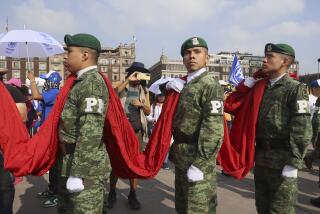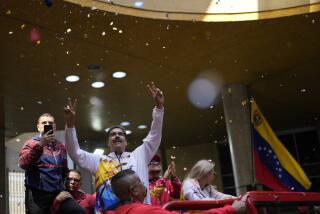Candidates See Price for Votes in Central Russia
- Share via
TULA, Russia — Cynical voters in central Russia go to the polls today for a democratic election, ruthless post-Soviet style, with their eyes firmly on the bottom line, their pockets stuffed with campaign freebies and a rogues’ gallery of parliamentary candidates from which to choose.
“Who cares who wins?” said Alexander G. Yermakov, editor of the local newspaper Tulskiye Izvestia. “People are treating this election as if they were betting on a horse at the races. It’s all just ‘Will my nag win?’ and ‘What can I get out of it?’ And they’re right to be cynical; it’s a reflection of the cynicism with which the candidates are treating them.”
Candidates for the parliamentary seat vacated last summer by Alexander I. Lebed--when he was briefly elevated by President Boris N. Yeltsin to run the nation’s security machine--are mostly big cheeses from Moscow who few locals believe will do much for them.
But the candidates are ready to make up for that by spending lavishly on getting votes in Tula, a two-hour drive south of Moscow. Natives of this depressed military-industrial town, which fell on hard times after demand dried up for Soviet weaponry, are more than happy to cash in.
The stink of greed hovered over the eager crowds--many in ratty fur caps, with cheap cigarettes hanging from their lips and vodka bottles in their pockets--pushing to get into the campaign headquarters of Yelena A. Mavrodi.
Mavrodi’s husband, Sergei, is the architect of a pyramid-scheme company called MMM that allegedly swindled hundreds of thousands of people out of their life savings in 1994. The model’s campaign, run as police make their fourth attempt to put her husband behind bars, was also organized along pyramid-scheme lines.
Tula residents grabbed at cash offered in return for forms they had filled in. They were given 50 cents to sign up as pro-Mavrodi “activists” and 50 cents for every friend, neighbor or passerby they signed up afterward.
“It’s all perfectly legal,” said Mavrodi’s campaign manager, Khalit A. Yakhin. “The electoral commission is trying to accuse us of buying votes, but all we are doing is hiring activists for campaign work. We also want to help the needy, and I sincerely hope that the people coming to us value our contribution.”
But the Central Electoral Commission decided late Saturday that Mavrodi’s tactics were illegal and barred her from the vote.
In any case, hardly any of the needy “activists” said they would vote for Mavrodi, whose political goals were unknown.
Most of them thought she only wanted to win a parliamentary seat to get enough respectability to keep her husband out of jail. It is the second time she has run.
Sergei Mavrodi also briefly became a deputy in 1994, successfully scotching an investigation into MMM by gaining the immunity granted to parliamentary deputies.
Also lurking in Tula is front-runner Alexander V. Korzhakov, a former Yeltsin bodyguard who was sacked from his Kremlin job last summer amid allegations that he and others were plotting to block last July’s presidential elections. Korzhakov’s campaign promises boil down to the bottles of vodka and packets of tea given to supporters a few weeks ago in bags containing invitations to vote for Korzhakov. The candidate also denies he was trying to buy votes.
When only half a dozen locals turned up at his final rally Friday, Korzhakov aides told reporters that the meeting had been canceled because Korzhakov’s chief opponent in Moscow, Yeltsin’s current administration chief Anatoly B. Chubais, had stopped throngs of eager voters from coming with the threat of police intimidation.
There were only two police officers visible at the door of the Mashzavod factory’s House of Culture, and neither stopped the pensioners carrying empty shopping bags who did want to enter.
Korzhakov’s main challenger, Russian chess champion Anatoly Karpov, has waged a relatively clean campaign, although he recently promised pensioners who have not received their monthly payments for up to six months that he will take the government to court on their behalf--a legal impossibility.
But residents are also skeptical about the electoral motives of Tula-born Karpov.
“His chess career is going sour; what has he got left, a year or two? And he’s had a lifetime of being a celebrity. Naturally he wants a new job which the state pays him for. He’s used to being in the limelight,” Yermakov said.
Among the local candidates, respectable Eduard A. Pashchenko, a former deputy, has been elbowed out of the limelight by the prominent Muscovites. And Nikolai A. Novikov, a wealthy reputed racketeer, has been unable to campaign because he is being held by the police on extortion charges.
His wife, Tatyana S. Novikova, says the charges are a terrible mistake. Corrupt local officials have framed her husband because he is the most honest man in town, she says. Of course, parliamentary immunity would help get the police off her husband’s back, but that’s not why he’s running.
“What can these Muscovites from out of town do for the people of Tula?” she asked. “Only my husband, with his slogan ‘I want to be everything to the people,’ can really help.”
More to Read
Sign up for Essential California
The most important California stories and recommendations in your inbox every morning.
You may occasionally receive promotional content from the Los Angeles Times.










